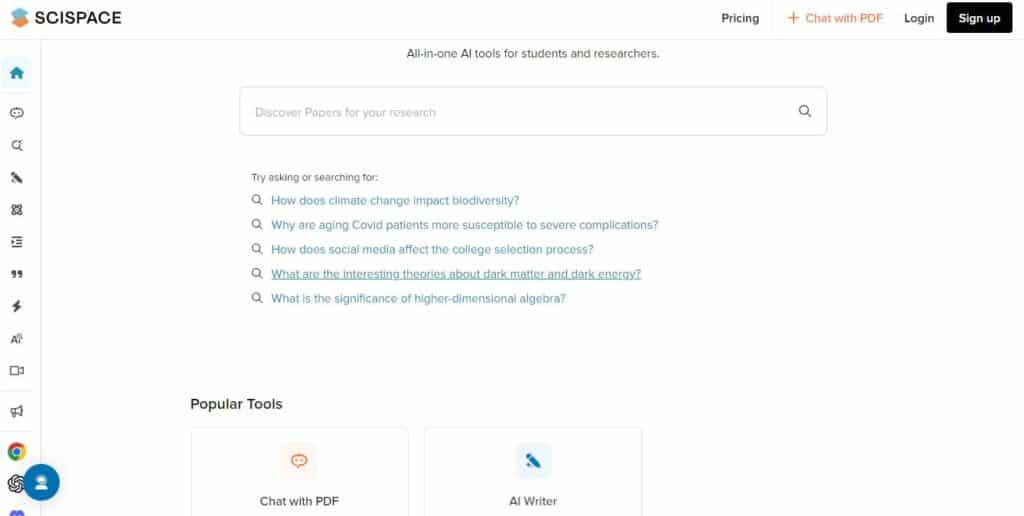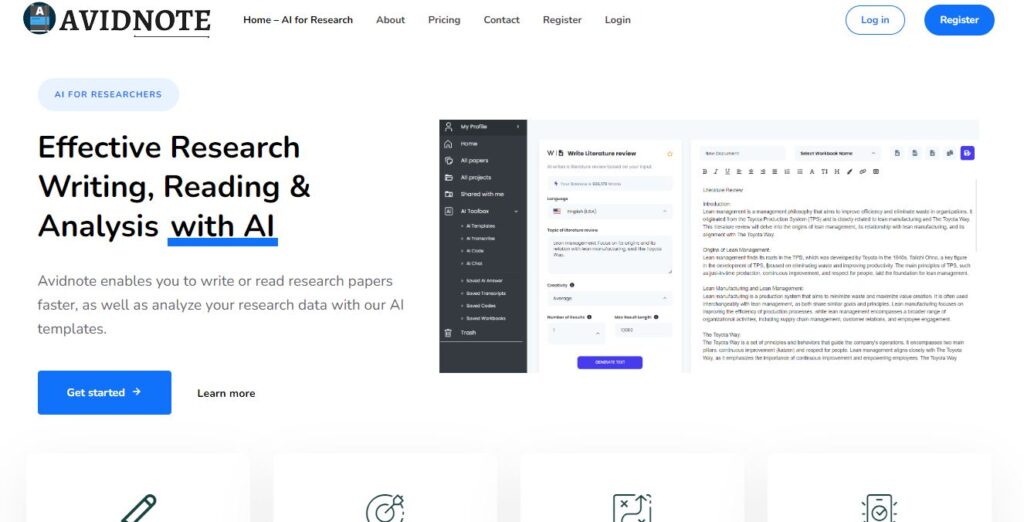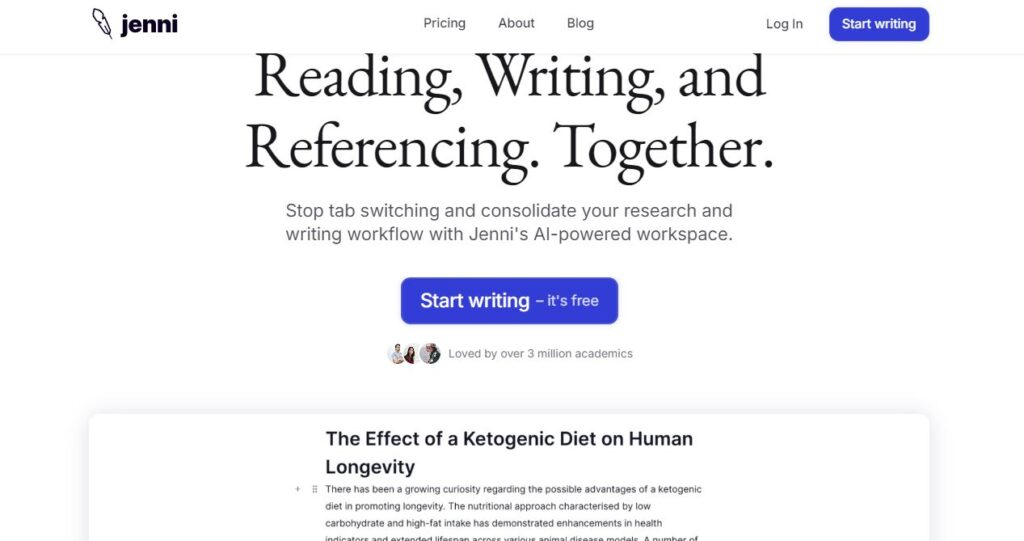AI has truly taken academia by storm, transforming how researchers and students approach literature reviews.
Gone are the days of spending weeks digging through databases, compiling sources, and summarizing findings. Now, with the advent of AI literature review tools, automating and speeding up the entire process has become not only possible but also extremely efficient.
In this article, we’ll dive into the best AI tools for literature review automation that can help you save time, read smarter, find relevant research, and structure your literature review effortlessly.
Best AI Tools for Literature Review Automation
Whether you’re a PhD student or a seasoned researcher, these tools will revolutionize how you approach academic work.
1. SciSpace

SciSpace is a powerful AI tool designed specifically for automating the literature review process. Rather than manually sifting through endless articles, SciSpace allows you to enter a research question, and it generates a synthesis of relevant papers.
It even summarizes top findings, methods, and research gaps in bullet points, saving you hours of manual reading.
Key Features:
- Generates summaries of top papers in response to specific research questions.
- Customizable columns to display findings, methods, and limitations.
- Supports integration with tools like Zotero for importing PDFs.
- Allows you to chat with the AI about individual papers or an entire group of papers, making deep analysis easier.
- Built-in AI writing assistance for creating notes, outlines, and even drafts of your literature review.
SciSpace is an all-in-one tool designed to make your academic work faster, more efficient, and better organized.
Best For: Researchers looking for a streamlined tool that handles everything from literature discovery to AI-generated summaries and outlines.
2. AvidNote

AvidNote is a fantastic tool for those who already have a collection of papers and need help extracting key information.
Unlike other search-based tools, AvidNote allows you to upload PDFs and directly chat with the document, ensuring accurate answers because the AI reads the actual text.
Key Features:
- Upload your PDFs and ask the AI specific questions about the content (e.g., methodology, key findings, limitations).
- Generates AI snippets and outlines based on your literature, helping you write faster.
- Provides document-specific insights, such as intercultural dimensions or the statistical methods used.
- Features writing assistance for literature review sections.
AvidNote excels in helping you organize, digest, and interpret specific papers, especially when they’re behind a paywall or require deep analysis.
Best For: Researchers with a large PDF collection who want an efficient way to analyze and write about their sources.
3. Consensus

Consensus is like an academic search engine on steroids, designed to give you rapid insights into the consensus of research on specific topics.
With its powerful summarization tools, it helps you quickly see what the literature says about a given research question.
Key Features:
- Summarizes key research findings on any given question.
- Displays consensus metrics, showing whether the academic community agrees or disagrees on a topic.
- Provides detailed summaries, citations, and insights into research papers’ quality (e.g., number of citations, journal ranking).
- Shows detailed information on paper types (e.g., randomized control trials, meta-analyses).
Consensus is a fantastic tool for those starting a literature review who want a quick snapshot of the field without diving into every individual paper.
Best For: Researchers seeking a big-picture view of a topic before diving into detailed analyses.
4. Jenni AI

Jenni AI focuses primarily on the writing aspect of your literature review. Once you have the literature at hand, Jenni helps structure, draft, and refine your writing.
It’s perfect for those who struggle with getting their ideas onto paper.
Key Features:
- AI-generated outlines tailored to your specific topic and needs.
- In-depth AI chat to help with defining concepts, drafting sections, or expanding on ideas.
- AI snippets that assist in structuring and refining your literature review.
- Built-in plagiarism checks and tools to ensure originality.
While Jenni doesn’t discover new literature for you, it excels at transforming your notes and ideas into a coherent draft.
Best For: Writers needing assistance with structuring and writing their literature review, especially those who struggle with starting the drafting process.
5. Research Rabbit

Research Rabbit is revolutionary in the way it visualizes connections between papers, allowing you to create literature review maps.
By seeing how papers are interconnected, you can quickly identify key works, research gaps, and major contributors in your field.
Key Features:
- Imports and analyzes your Zotero collection or manually uploaded papers.
- Creates visual maps showing connections between papers and authors.
- Helps you identify influential papers, research trends, and connections across the literature.
- Displays references, citations, and author collaborations in an intuitive, visual format.
Research Rabbit is a game-changer for those who want to see the bigger picture of their literature, making it easier to identify trends and gaps in the research.
Best For: Visual learners and researchers looking to map out their literature review in an intuitive, interconnected way.
Conclusion
AI tools like SciSpace, AvidNote, Consensus, Jenni AI, and Research Rabbit are revolutionizing the way literature reviews are conducted.
They allow researchers to find relevant text faster, read literature more efficiently, and identify research gaps with ease. These tools also help structure your review and assist in writing, ensuring you produce high-quality, well-organized research.
If you’re looking to automate and streamline your AI literature review, now is the time to jump on the AI train and start using these tools. Otherwise, you might find yourself missing out on one of the most significant advancements in academic work.
By integrating literature review automation AI into your workflow, you’ll be able to focus on the critical thinking aspects of research, allowing AI to handle the tedious tasks that often slow researchers down.







